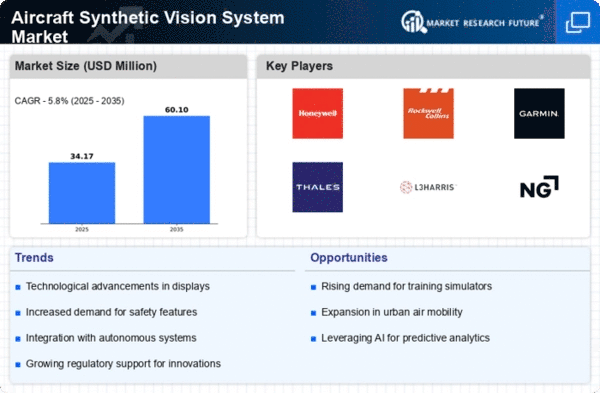Top Industry Leaders in the Aircraft Synthetic Vision System Market

The Aircraft Synthetic Vision System (SVS) market is a dynamic landscape characterized by innovation, technological advancements, and strategic manoeuvres among key players striving to gain a competitive edge. SVS technology has revolutionized flight navigation and safety by providing pilots with enhanced situational awareness, real-time terrain information, and reduced visibility limitations. The market is witnessing robust growth due to increasing demand for safer and more efficient flight operations.
The key players of the synthetic vision system Industry are
- Rockwell Collins
- Honeywell International
- SAAB Sensis
- Garmin Ltd
- ForeFlight
- Hilton Software
- Aspen Avionics
- Rockwell Collins
- Multi Electric Manufacturing Inc
- Astronics Corporation
- Universal Avionics System
- L-3 Avionics Systems
Strategies adopted by these key players revolve around technological innovation, strategic partnerships, and market expansion. Continuous advancements in sensor technologies, integration of artificial intelligence and machine learning, and the development of augmented reality interfaces are some of the focal points driving innovation in SVS systems. Collaborations and partnerships with aircraft manufacturers, airlines, and regulatory bodies further reinforce the market presence and drive the adoption of SVS technology.
Factors contributing to market share analysis in the Aircraft SVS market encompass technological expertise, product differentiation, pricing strategies, regulatory compliance, and customer-centric approaches. Companies offering comprehensive SVS solutions with superior performance, reliability, and cost-effectiveness tend to gain a larger market share. Additionally, adherence to aviation regulations and certifications play a pivotal role in establishing trust and market penetration.
The landscape also witnesses the emergence of new and innovative companies aiming to disrupt the market. Startups and emerging players, such as Vision Systems International (VSI), are focusing on niche segments within SVS technology, introducing specialized solutions catering to specific aircraft types or functionalities. These newcomers bring fresh perspectives, agility, and niche expertise, posing potential challenges to established players.
Industry news reflects the market's dynamism, with frequent announcements of strategic alliances, product launches, and regulatory approvals. Collaborative ventures between SVS technology providers and aircraft manufacturers are becoming more prevalent, aiming to integrate SVS as a standard feature in new aircraft models. Moreover, advancements in augmented reality, AI-driven decision support systems, and enhanced data analytics are driving the evolution of SVS technology.
Current company investment trends in the Aircraft SVS market highlight a substantial focus on R&D initiatives, technological partnerships, and market expansion strategies. Key players allocate significant resources to research and development to stay ahead in the technological curve, constantly improving system capabilities and reliability. Moreover, strategic investments in expanding global footprints, establishing regional offices, and forging alliances with local partners signify efforts to capture diverse market segments.
Overall, the competitive scenario in the Aircraft SVS market is characterized by intense rivalry among established players, the emergence of innovative startups, rapid technological advancements, and a persistent drive for market expansion and differentiation. The market's trajectory is influenced by ongoing technological breakthroughs, regulatory developments, and the ability of companies to adapt to evolving customer needs and industry standards. As demand for safer and more efficient flight operations continues to grow, the Aircraft SVS market remains poised for further innovation and competition, promising a future landscape defined by cutting-edge technologies and strategic collaborations.
Recent Development:
October 2022, Collins Aerospace secured a Technical Standard Order (TSO) for its Combined Vision System (CVS), designed for business aviation aircraft. This innovative system ensures pilots have clear visibility in various weather conditions, enabling confident and secure navigation through situations with low visibility.
October 2022, Simultaneously, Garmin International Inc., a unit of Garmin Ltd, announced the attainment of Supplemental Type Certification (STC) from the Federal Aviation Administration (FAA) for the GI 275 electronic flight instrument installed in the Dassault Falcon 7X business jet. This certification reflects the instrument's compliance with aviation standards, enhancing the aircraft's flight instrumentation capabilities.
October 2021, Honeywell unveiled an industry-first aircraft cockpit system called the Honeywell Anthem flight deck. It introduces an always-on, cloud-connected experience that significantly enhances flight efficiency, operational safety, and passenger comfort. The system offers unprecedented levels of connectivity, featuring an intuitive interface inspired by everyday smart devices. Its highly scalable and customizable design redefines cockpit technology in the aviation industry.











